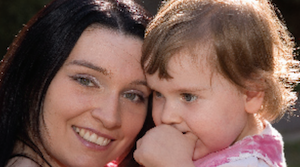Early Intervention Helps Children and Families

If you have a young child with disabilities or developmental delays, you probably already know that challenges can meet you at every turn. Maybe your baby doesn’t eat well and mealtimes are a problem. Or maybe your toddler can’t climb stairs and throws tantrums in frustration. Perhaps your child is almost 3 and still isn’t speaking. Such issues can lead to even more problems. Your child’s growing, learning, and developing may be slowed, for example, or your family’s participation in social or community activities may be limited. The situation can feel overwhelming to any family.
“The good news is that help is available,” says Judy Swett, an early childhood parent advocate for PACER Center. “Through Part C of the Individuals with Disabilities Education Act (IDEA), early intervention services can meet the developmental needs of eligible children up to age 3 and provide supports to their families. Services may include anything from speech therapy for your child to information on helpful community resources for you. Your strengths, resources, needs, priorities, wishes, and concerns as they relate to the development of your child are of prime importance to those working with your child and family.”
The benefits don’t stop there. All families who receive early intervention services also have a service coordinator who can help make services work across agencies. Additional supports and services may include parent training as well as counseling and social work services.
To find out if your child qualifies for early intervention services, you can ask your school district for an evaluation. If you prefer, your doctor, child care provider, or other family member may make the request for you. A team that includes you will be formed to learn about your concerns and create an evaluation plan that will consider all areas of your child’s development. Once you give your written permission, the evaluation can begin.
If your child qualifies, you’ll participate in a family assessment so the team can learn about what’s working and what isn’t as you parent your child with a disability or developmental delay. These areas of concern will then be written into an Individualized Family Service Plan (IFSP), a document that maps out goals for your child and family for one year. Depending on your child’s needs, goals will focus on developing basic skills such as communication, mobility, cognition, social interaction, and self-care. Your family goals might include such things as learning more about your child’s disability, accessing child care, participating in community activities, or meeting other parents.
With the goals clearly defined, the team will then consider what services are needed. If your infant daughter has trouble eating, for example, the IFSP team might write a goal that involves your child being able to suck and swallow. They’ll also discuss what services she will need and who will provide them. Family goals that you have identified, such as finding caregivers, also will be written into your IFSP. The team will support you in achieving them as well.
“Children grow, develop, and learn in the context of relationships with their families and other caregivers in everyday routines and activities,” Swett says. “As a parent, you are essential to the decision-making process in early intervention. You are the expert about the needs of your child and your family. You also are a key member of IFSP team, and your involvement is necessary if your child and family are to be served well.
“Having a child with disabilities or developmental delays can be challenging,” Swett adds. “Fortunately, early intervention services are family centered and can give you the supports and services you need to help your child grow, learn, and develop. Those services also can teach you how to advocate for your child and support your participation in your community to the extent that you desire.”
Information in this article applies to families who live in Minnesota. Each state has its own policies under the federal law.
